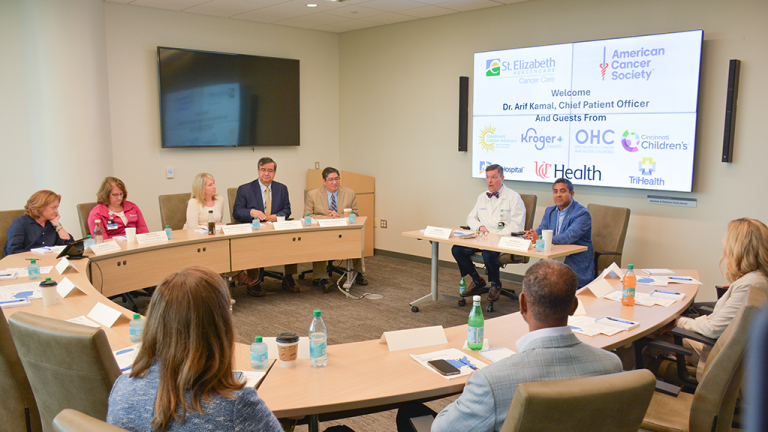Cancer remains one of the most pressing health challenges in the United States, with an estimated 2,041,910 new cancer diagnoses in 2025. Even with significant advancements in treatment and care, the fight against cancer continues to demand innovation, collaboration and unwavering dedication from our healthcare professionals.
The American Cancer Society (ACS) reports 1 in 2 men and 1 in 3 women will be diagnosed with cancer in their lifetime. Understanding that the Northern Kentucky and Cincinnati region are not exempt from these stats, St. Elizabeth Healthcare hosted a roundtable this May featuring Dr. Arif Kamal, Chief Patient Officer of ACS, alongside experts from the following organizations united in the fight against cancer:
- Cincinnati Cancer Advisors
- Cincinnati Children’s
- Kroger Health
- Oncology Hematology Care
- St. Elizabeth Healthcare
- The Christ Hospital
- TriHealth
- UC Health
The roundtable fostered collaborative dialogue around the latest treatments and innovations in cancer care, drawing on each leader’s unique insights and experiences. “I know all the systems in our region are doing amazing things and today we can share what makes us special so that we can all better help our community,” said Dr. Douglas Flora, MD, the Executive Medical Director of Oncology Services at St. Elizabeth Healthcare as he opened the floor.
Here are the top themes and key takeaways from the discussion.
Collaborative Efforts
Leaders at the roundtable agreed regarding the importance of collaborative efforts to advance cancer care and research. This includes partnerships between different health organizations, academic and industry initiatives, international cooperations and even collaborations among traditionally competitive organizations – all with the shared goal of improving outcomes, enhancing research, promoting prevention and addressing equity in cancer care.
Science and Clinical Trials
The importance of scientific advancement and clinical trial programs was repeatedly emphasized. This includes the success of initiatives that significantly increase clinical trial enrollment, the need to make trials more accessible within the community and the impact of continuous research funding, particularly for implementing new scientific discoveries into practice. Breakthroughs in areas like immunotherapy, cellular therapy, antibody-drug conjugates and oncolytic viruses were highlighted as direct results of strong scientific pursuit.
Prevention and Early Detection
There was a clear focus on shifting toward more proactive cancer care strategies. Key concepts include “Food as Medicine” initiatives, the establishment of dedicated cancer prevention clinics for early detection and intervention in high-risk individuals, and the critical need to address gaps in cancer screening guidelines to catch cancer at its earliest stages. In addition to early detection, the importance of preventative care was addressed. “While some cancers can’t be prevented, it’s significant to recognize that nearly half of adult cancer diagnoses have a modifiable lifestyle risk factor, including healthy eating, exercise, tobacco use, body weight and BMI, and alcohol consumption,” said Dr. Kamal.
Precision and Personalized Medicine
The conversation recognized that precision and personalized medicine are critical approaches that are quickly advancing and transforming cancer treatment. This involves sophisticated solutions like integrated platforms for rapid genetic profiling, large-scale exome sequencing projects to build comprehensive genetic databases, the incorporation of pharmacogenetics to tailor treatments like chemotherapy for individual efficacy, and reduced toxicity and the emerging potential of artificial intelligence to help determine the most effective, personalized treatment pathways.
Unprecedented Progress in Cancer Care
The collective innovations, advancements and collaborative efforts discussed painted a clear picture of unprecedented progress in the fight against cancer. This optimistic outlook is fueled by significant increases in clinical trial participation, advances in cutting-edge therapies (including immunotherapies and cellular therapies), a growing emphasis on prevention and early detection strategies, the transformative power of precision medicine and a pervasive collaborative spirit. Future directions, such as moving toward more decentralized care models and maintaining a strong emphasis on empathy and compassion, further reinforce this hopeful trajectory.
Continuing to Make Strides
This roundtable was a strong reminder of the progress being made in cancer care and the importance of working together to continue making advancements. Moving forward, the collective efforts and breakthroughs shared will be taken back with each of the guests to ensure their patients continue receiving the best possible outcomes and support. “There is so much that goes beyond the cancer cell itself. It goes into how we preserve people’s humanity and their dignity,” says Dr. Kamal. “Compassion equals empathy plus action.”
To learn more about Cancer Care at St. Elizabeth or our clinical trials, visit our website or call (859) 301-4000. If you would like to learn more about ACS, visit www.cancer.org.

